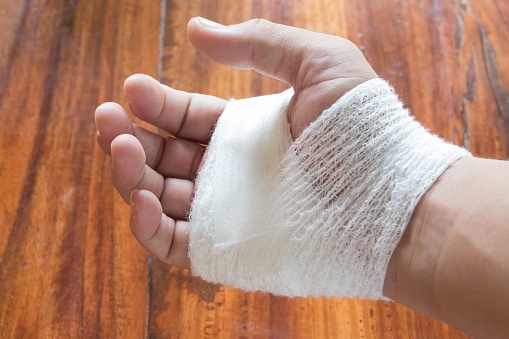Scura, Wigfield, Heyer, Stevens & Cammarota Blog
- Blog
Can You Receive Compensation for Occupational Claims in New Jersey?
Wear and tear injuries are often overlooked by employees, dismissed as nothing significant, even though these injuries, developed over time, can merit workers’ compensation aid as occupational claims. When people discuss workers’ compensation, they imagine critical and dramatic injuries. They imagine someone at a factory, their arms crushed under gears. They imagine drivers T-boned against a building front.
However, many people dismiss the prevalence of injuries that develop over time. Exposure to some chemical or repetitious physical actions can, over time, result in serious and painful injuries that are just as debilitating as a more dramatic and immediate injury. You are entitled to occupational claims for wear and tear injuries.
What are Wear and Tear Injuries?

Some people are uncertain what qualifies as wear and tear injuries. To understand the difference, it is vital to differentiate an on-the-spot injury and a wear and tear injury.
Some injuries incurred at the workplace are immediate and obvious. Burns? Crashes? Blunt impact? These injuries can be directly sourced to a specific occurrence while on duty. Not all work-related injuries, however, are this obvious. Rather, some injuries that might be incurred are the result of repeated action over a prolonged period of time.
Wear and tear injuries are the result of physical deterioration over time. These injuries are not always immediately apparent to the injured parties. For example, if your job requires repeated heavy lifting, then after awhile your joints or muscles might be injured as a direct result of you performing this action repeatedly. Even though no one work-related incident resulted in this injury, it is nonetheless a direct consequence of your work and the physical strain that comes with it.
Other jobs expose individuals to prolonged exposure to substances or hazards that can gradually break down your body and system. Breathing in chemicals over a long period of time can cause chronic conditions that might impede your ability to work and quality of life.
These chemicals can come from air-based or liquid chemicals that you are regularly exposed to. Any gas leaks or health risks can result in your deteriorating health, which, thus, results in you being critically hurt over a period of time. This is to say nothing of radiation damage, which can come with certain jobs where you can potentially be exposed to low-levels or high-levels of radiant energy.
In addition, when working, it is important to note that any pre-existing injury or medical condition made worse by your working conditions also qualifies as wear and tear damage. Have a bad hip? Your job might have made it worse, which means you qualify for workers’ compensation.
How Do I Receive Workers’ Compensation Aid for Wear and Tear Injuries?
Once you have determined that you are injured and have reported the incident to your employer, you will need to request to be scheduled with an authorized medical provider affiliated with your employer’s insurance carrier, in addition to being able to confirm proof of employment and reported weekly wages. If you are working off the books, you will need to provide proof of employment.
Ideally, workers’ compensation should not be something you fight for. You inform your employer you are injured and, as a result, you receive treatment. Typically, you have 90 days to report any injuries incurred at work, though it is best to inform your employers as soon as possible that you have been injured on the job.
Once you inform your employer of your injury, you will, if everything goes right, come in contact with your employer’s insurance provider, who will then provide or furnish authorized medical treatment if accepted, in addition to potential financial temporary disability benefits.
However, for a myriad of reasons, employers and insurance companies might refuse to offer you monetary compensation or try to pay you less than they owe you. When this happens, you take the matter to court.
How Can an Attorney Help with Occupational Claims?

An attorney trained to help with Workers’ Compensation and Occupational Claims suits can help you discuss your needs with employers, insurance companies, and the Department of Labor for you. They will maintain a factual archive of all relevant information for your cases in order to maintain an organized database for your case. Should your employer or insurance company attempt to downplay how much money you are owed or attempt to subvert their responsibilities to you, then they will fight for you.
If you come with an occupational claim, we recommend you come with medical records supporting treatment or complaints to the injured body parts you’re alleging happened over the course of time. If you can show medical treatment to the body parts that are affected, barring that it was not totally unrelated to your occupation, then you have more of a fight for an occupational claim. You have to be able to show some course of continued treatment, rather than just something new that emerges after being terminated from your job.
Of course, every case is unique and different. Every case is fact-specific. Hypothetically, a construction worker without medical insurance works every day, unable to take time off to feed his family. Over the course of fifteen or twenty years of hard labor, he ends up with perpetual wear and tear injuries. A lawyer would look at the case even without a detailed medical record. However, everything must be causally related.
If you feel as though your insurance companies are lowball estimating what you are owed due to wear and tear injuries, you might require a workers’ compensation lawyer who can help fight to get you the care you need. That’s where we come in.
The attorneys at Scura, Wigfield, Heyer, Stevens & Cammarota LLP can help. Please call our offices to schedule a free consultation and hear your options.
Share Article
Need Help? Contact Us Today!





Lists by Topic
- Bankruptcy (320)
- Personal Injury (95)
- Chapter 13 (52)
- Chapter 7 (50)
- Debt Management (50)
- Foreclosure (47)
- Accident (32)
- Car Accident (26)
- Chapter 11 (24)
- Business Bankruptcy (19)
- Credit (18)
- Insurance Claims (17)
- Business Law (12)
- Litigation (12)
- Employment Law (11)
- Probate and Estate Law (11)
- Damages (10)
- Medical (10)
- Product Liability (10)
- Workers Compensation (10)
- Attorney (9)
- Consumer Bankruptcy (9)
- Commercial & Residential Real Estate (6)
- Slip and Fall (6)
- Contracts (5)
- Premises Liability (5)
- Repossession (5)
- wrongful death (5)
- Video | Bankruptcy (4)
- Bankruptcy Cost (3)
- Corporate Litigation (3)
- Trial Law (2)
- student loans (2)
- tax (2)
- Attorney Fees (1)
- COVID-19 (1)
- Certified Civil Trial (1)
- Dog Bites (1)
- News (1)
- Relocation Assistance (1)

